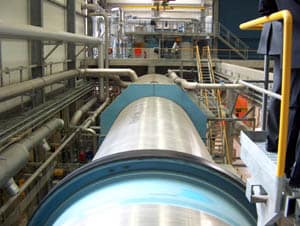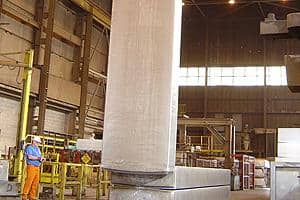The recycling and waste sector has given a mixed response to the agreement on revisions to the Waste Framework Directive, which include new recycling targets.

Recording recycling at the reprocessing stage was welcomed by the Resource Association
Yesterday, letsrecycle.com reported that an agreement was reached between the European Council and the European Parliament, which included a rate of 55% by 2025 for municipal waste (see letsrecycle.com story). Member States still have to ratify the agreement but the agreement is seen as the package which is likely to be adopted.
In the wake of the agreement, which also featured landfill targets, producer responsibility, and new measures for recording recycling, the Resource Association described it as a “mixed bag” of decisions.
Prevention
Chief executive of the Resource Association, Ray Georgeson said: “Higher recycling targets are to be applauded, as they set the direction of travel and, combined with some further efforts on waste prevention, take us further forward but not as far or as quick as many would wish.
“Given that confusion still reigns over how best to calculate recycling anyway, it was probably the best we could hope for at this stage.”
“Higher recycling targets are to be applauded”
Ray Georgeson, chief executive
Resource Association
Despite describing proposals for recycling calculation to be recorded at the reprocessing stage as a step in the right direction, Mr Georgeson said the method is still “unsatisfactory”. He said: “It relies on the uncertain process of agreeing ‘average loss rates’ for materials in sorting and processing and potentially leaves too much wriggle room for Member States to continue to interpret recycling rates in their own way.”
‘Timid’
While the European Environmental Bureau (EEB) described the revisions as a “significant improvement”, it was critical of the “timid” steps taken in terms of recycling rates.
Piotr Barczak, waste policy officer at the EEB said: “This is not the outcome we all hoped for, but it is nonetheless a significant improvement compared with the laws that are currently in place.”
However, Mr Barczak said member states lacked the ambition shown by the European Parliament and Commission throughout the negotiations, “especially with regards to recycling and preparation for reuse.”
And, in regards to the 10% cap on landfill by 2035, Mr Barczak said: “With no similar restrictions on the amount of waste being burned, the risk is that some member states will now shift to incineration rather than recycling and reuse.”
Metals
Meanwhile, proposals for recycling to be counted when the materials are reprocessed have been welcomed by the metals recycling sector.
The European non-ferrous metals association, Eurometaux, said the circular economy waste deal is “a step forward” for metals recycling, but warned that ambition was lost in key areas.
Guy Thiran, Eurometaux’s director general, said: “Although we had recommended a harmonised measure, we’re pleased governments will take a first step beyond only reporting what’s collected or sorted.”
He said the Commission will have a key role in making sure the new method works in practice and Member States should be prevented from making estimations that continue overstating their recycling performance.

Eurometaux said the deal falls short for aluminium packaging
However, the Association was critical of allowing flexible recycling targets for aluminium and other packaging.
Eurometaux described this as one of “several potential loopholes” for Member States to escape the package’s overall ambition.
Under the agreement, all authorities will be obliged to measure recycling rates at input to the last recycling process, or otherwise to estimate the losses occurring after first sorting operations, Eurometaux reports.
Mr Thiran continued: “Europe’s waste legislation is judged by the ambition of its targets. By that measure, today’s deal falls short for aluminium packaging.”
He said a 50% recycling target for 2025 does not send a strong enough signal for Member States to invest in more efficient sorting technologies.
“We’re concerned this complex derogation will give Member States a free pass to ignore individual packaging streams. A Circular Economy requires equal ambition in all areas,” Mr Thiran explained.
Losses
The European Steel Association (EUROFER), based in Brussels, has also praised the move to record recycling at the reprocessing stage.
Commenting on the current system, EUROFER explained that measuring recycling at the waste collection stage generates significant losses later on in the recycling value chain.
“The proposal only goes part of the way towards accurate, harmonised measurement of real recycling”
Axel Eggert, director general
EUROFER
Despite praising the new methodology, Axel Eggert, director general of the association, said: “The proposal only goes part of the way towards accurate, harmonised measurement of real recycling because a derogation allows member states to declare material as ‘recycled’ even after an early waste sorting stage.”
He warned this will give vastly different results than measuring recycling at the stage of reprocessing into new products. He said this will allow for disparate recycling rates between the member states.
“The role of the Commission will be even more important during the implementation phase in ensuring greater harmonisation and reducing data gaps, tasks which are in the interest of all the member states,” concluded Mr Eggert.
The post Resource sector responds to ‘mixed bag’ of waste revisions appeared first on letsrecycle.com.
Source: letsrecycle.com Metal




